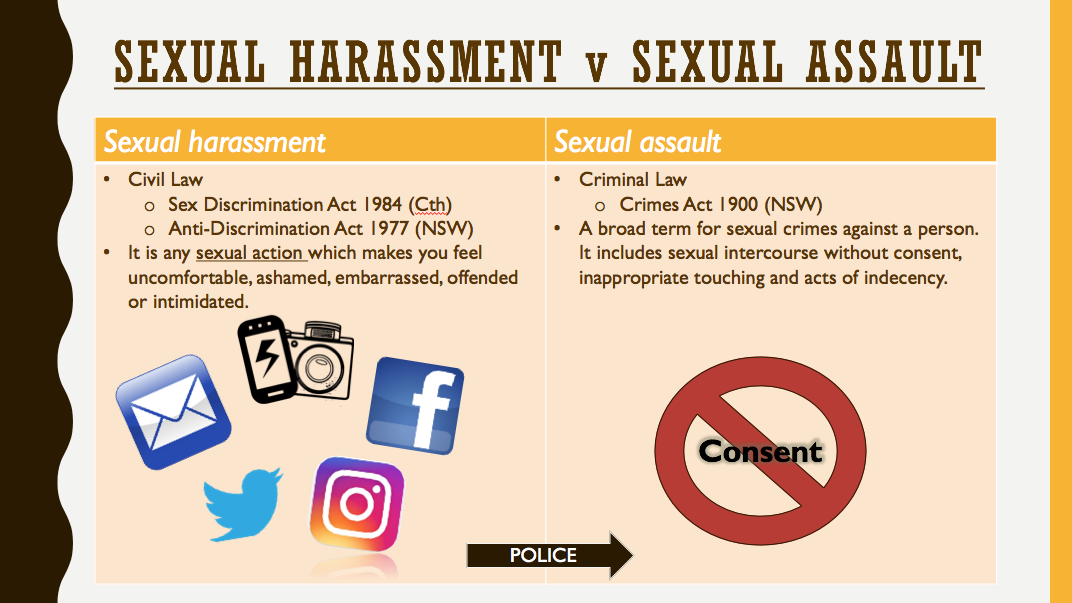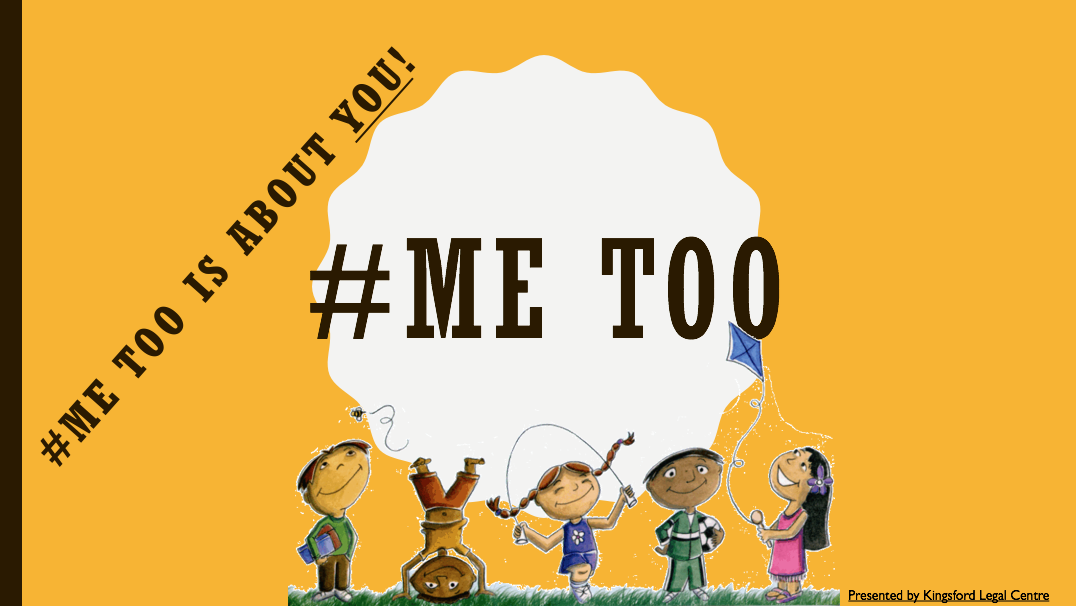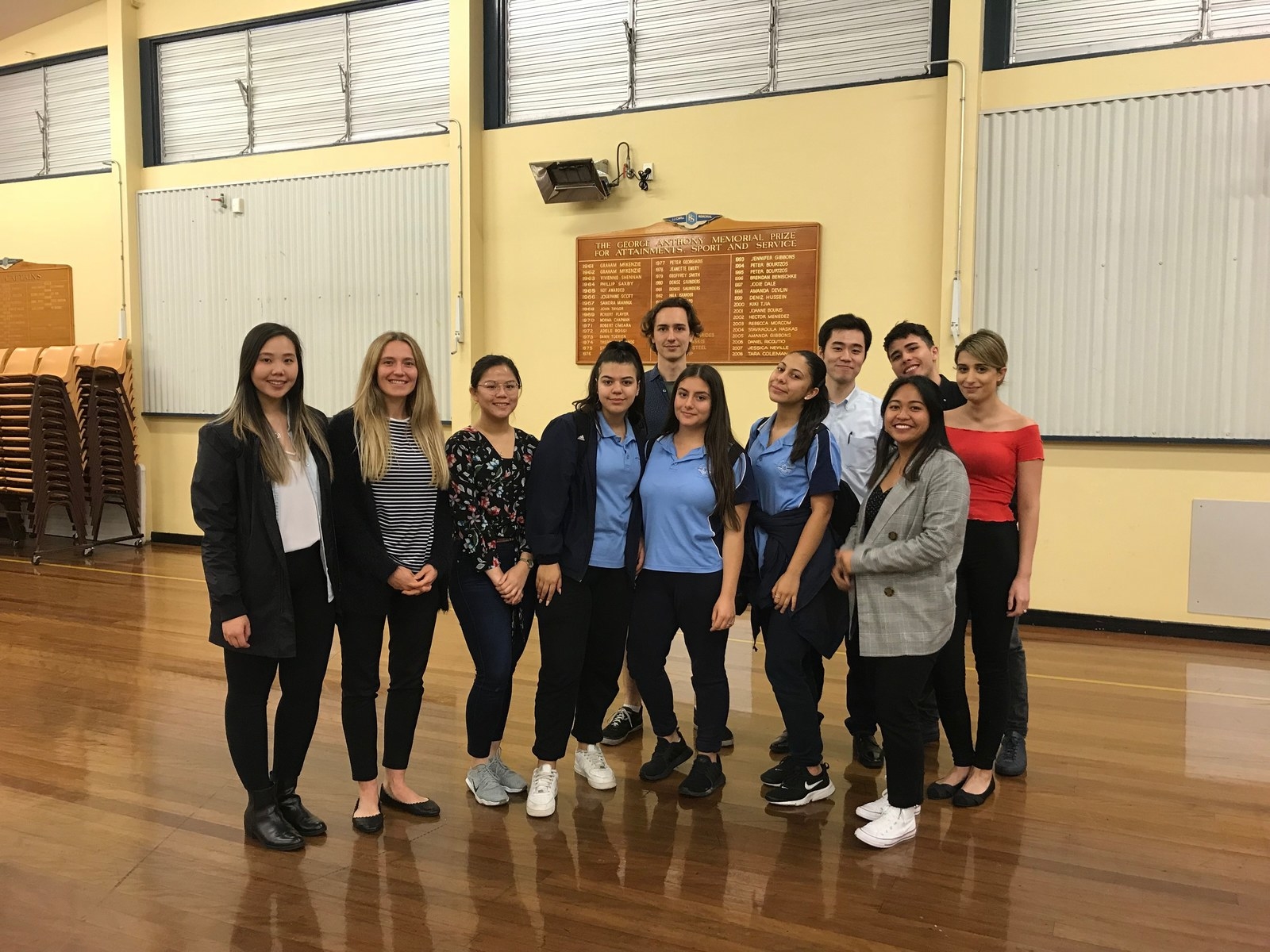"How many of you have heard of the hashtag #MeToo?"
Just one of the thirty-something Year 10 students gathered in the gym at J J Cahill Memorial High School, raises her hand, as do two teachers.

Law students from the University of New South Wales hand iPhones to the high school students and ask them to type words they associate with sexual harassment or sexual assault.
"Stalking", "Uncomfortable", "Consent", "Inappropriate", "Photos", "Scary", "Pressure", "Intimidating". The words appear on a giant screen in real time and those entered the most frequently grow largest: "Touching", "Unwanted", "Rape".
Amy Lin Lee, a fourth-year law student, explains the difference between sexual harassment, which is dealt with in civil law, and sexual assault, which is dealt with in criminal law.
"An important thing to remember is that not all sexual harassment equals sexual assault, but all sexual assault equals sexual harassment," Lin Lee tells the students. "It is not just something that happens to girls, it happens to guys too."
She explains that sexual harassment is any sexual action which can make you feel uncomfortable, ashamed or intimidated, while sexual assault includes inappropriate touching as well as rape.
The students peel off into smaller groups. A circle of seven boys sits cross-legged on the floor and guesses whether scenarios involve sexual assault or sexual harassment.
The facilitating law student, Michael Moryosef, describes a situation in which male students stick rulers up a girl's skirt. Nervous laughter ripples around the circle.
Six of the seven boys correctly identify "sexual assault". The seventh insists it is harassment: "They weren't bashing her!"
One of the female students, a 15-year-old, later tells BuzzFeed News this exact scenario had happened to her and her friends.
"And in primary school they used to pull up our skirts and put sticks up there," she says. "I actually didn’t know the difference between harassment and assault until today."
When one boy is the first in the group to correctly differentiate between sexual harassment and sexual assault, he grins and dabs.

The boys are asked whether a woman who likes to wear short skirts is "asking for it" and deserves lewd comments.
"Is it sexual harassment?" one boy asks, confused. "But she's doing it for herself ... she's throwing herself out there?"
"Maybe she could wear a longer skirt and a looser top then?" one boy offers earnestly.
"If she's obviously getting stared at and stuff and she feels uncomfortable then don't wear that stuff again," one boy says. "If she's going to keep wearing that, then that is on her."
Moryosef asks if the boys think they should personally cover up from arm to ankle at the beach to avoid unwanted attention. They're all silent for a few moments.
"OK it is sexual harassment," they all conclude about the scenario.
"What if a girl asks for your number because she thinks you're cute on Instagram?" one boy asks.
"Well I think what that comes down to is consent, and if it is unwelcome, that is where you have to stop," Moryosef says.
"Is it sexual harassment to ask a girl for a kiss?" he asks. "I'm confused."
The boys are bewildered by a scenario in which a "not very sporty" boy who has a lot of female friends gets called "poofter".
"There is nothing sexual about that at all!" one boy exclaims.
Moryosef asks how the boy who was being bullied might feel.
"Sad". "Uncomfortable". "Discluded" [sic]. "Disappointed".
One boy can't stop laughing.
"You'd find it funny if someone called your mate a poofter?" Moryosef asks.
"It depends, if I know he doesn't care, then..." the boy shrugs.
"What if you stand up for your friend and get bashed?" one boy asks seriously.
"You shouldn’t really care if you get called a faggot if you’re hanging out with girls," one boy decides. "If his friends are doing that then they’re not really his friends."

They discuss whether it is OK to ask a female teacher about her love life.
"There is a line you don't cross," one boy says.
"How do you know where that line is?" asks Moryosef.
"You know when a teacher is uncomfortable, you can see in their body language."
The school's deputy principal John Mifsud says the free program, run by Kingsford Legal Centre, helps students to establish "where they stand legally" and also "offer emotional support" to each other.
"We don't really have the issue of sexual harassment or bullying of a sexual nature, but I think these kids are pretty worldly and know this happens in the community," Mifsud tells BuzzFeed News.
"I think it is an appropriate age for kids at 14, 15 and 16 to learn about this."
A circle of girls is very interested in where the exchange of sexually explicit images falls into this discussion.
"If a photo gets out and it gets sent to someone, are they being sexually harassed?" one girl asks.
"If I have someone's nudes and I leaked it would I get charged for it now, or when I'm an adult?" another asks.
The law student facilitating their discussion explains the circumstances in which "sexting"or sharing explicit images can be a crime — when it involves harassment, sharing the images without consent, or someone under 18.
The girls talk about how they would feel if photos of them were sent to strangers.
They tell BuzzFeed News that people send nudes to each other on SnapChat because it "disappears straight away".
"But then lots of people just take a photo of the screen with another phone so the person [sending the photo] doesn't know," one girl says.
They describe a school meeting at which someone used AirDrop to send a "a whole bunch of nudes" to multiple students on their iPhones.

The girls are asked why someone might stay silent about being sexually harassed or assaulted.
"Fear of being the only ... well, like what if I was the only one and it didn't happen to anyone else, and then it's my word against theirs, and what if there is not really a case?" one girl says.
"Being judged from like your parents or from the community."
"They might feel ashamed of themselves."
"They might have been threatened by the person who did it to stay silent."
Lin Lee reads out statements for the students to identify as true or false.
"There needs to be a witness for sexual assault to be investigated."
The student who answered "false" gets lollies.
"Comments of a sexual nature that make you feel uncomfortable are sexual harassment."
The student who answered "true" gets lollies.
One student says he already knew the difference between sexual harassment and assault.
"Most of the guys wouldn't think twice about it because it is fun and games to them," the 16-year-old tells BuzzFeed News.
"I think most people probably knew the difference between harassment and assault but I feel like this day reinforced what it could actually do to a [victim]."
If you or someone you know is experiencing violence and need help or support, there are national and state-based agencies that can assist you 24 hours a day, seven days a week. Call 1800 RESPECT (1800 737 732).
